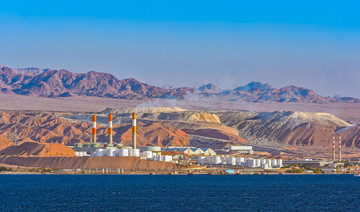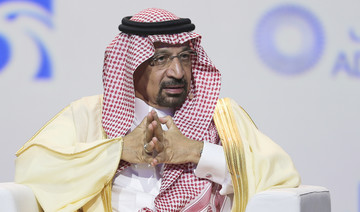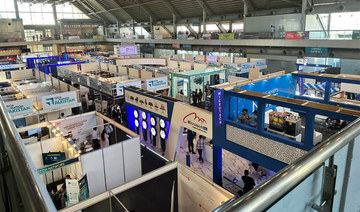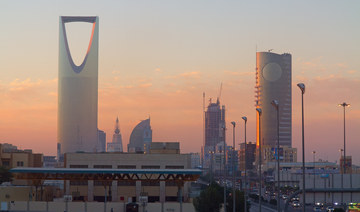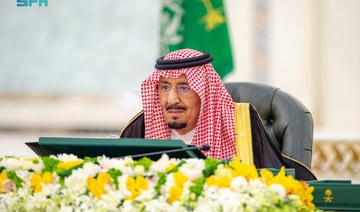SINGAPORE: Oil prices on Wednesday clawed back some of the previous day’s more than 6 percent plunge, lifted by a report of an unexpected decline in US commercial crude inventories as well as record Indian crude imports.
But investors remained on edge, with the International Energy Agency (IEA) warning of unprecedented uncertainty in oil markets due to a difficult economic environment and political risk.
International Brent crude oil futures were at $63.19 per barrel at 0239 GMT, up 66 cents, or 1.1 percent from their last close.
US West Texas Intermediate (WTI) crude futures, were up 66 cents, or 1.2 percent, at $54.09 a barrel.
Wednesday’s gains came after a report by the American Petroleum Institute late on Tuesday that US commercial crude inventories last week fell unexpectedly by 1.5 million barrels, to 439.2 million, in the week to Nov. 16.
Record crude imports by India of almost 5 million barrels per day (bpd) also supported prices, traders said.
Yet Wednesday’s bounce was small in the context of the general market weakness, which saw crude tumble by more than 6 percent the previous session amid a selloff in global stock markets.
“The global economy is still going through a very difficult time and is very fragile,” IEA chief Fatih Birol said on Tuesday.
“Rising global growth fears smashed oil markets and saw European and US shares slide,” futures brokerage CMC Markets said in a daily note.
With output surging and the demand outlook deteriorating, the Organization of the Petroleum Exporting Countries (OPEC) is pushing for a supply cut of between 1 million and 1.4 million bpd to prevent a repeat of the 2014 glut.
“We would anticipate further weakness until the reaction from OPEC+ (Dec. 6) and the G20 summit is clearer (Nov. 30/Dec. 1),” said Ashley Kelty, oil analyst at investment bank Cantor Fitzgerald Europe.
Despite an expectation of OPEC-led cuts, Brent and WTI prices have slumped by 28 and 30 percent respectively since early October, and the entire structure of the forward price curve has changed.
The Brent forward curve was in steep backwardation in October, implying a tight market with prices for spot delivery higher than those for later dispatch. This makes it unattractive to store oil.
Since then, however, the curve has moved into contango for most of 2019, implying oversupply as higher prices further out make it attractive to store oil for later sale.
“Investors are becoming increasingly concerned that any potential production cuts by OPEC will be insufficient to cover the surplus in the market,” ANZ bank said on Wednesday.
“The list of reasons for the decline are pretty specific ... too much supply and a risk of slowing demand growth,” said James Mick, Energy Portfolio Manager with US investment firm Tortoise.
“Part of the supply issue has been surging US production,” he added.
US crude oil production has jumped by almost a quarter this year, to a record 11.7 million bpd largely because of a surge in shale output.
Oil recovers some losses after 6% plunge but markets remain wary
Oil recovers some losses after 6% plunge but markets remain wary
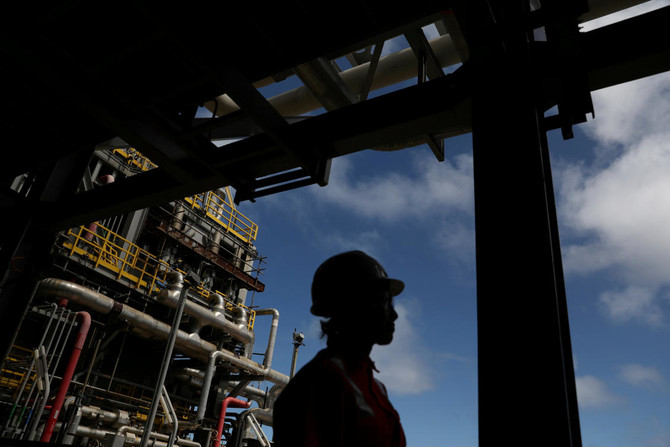
- Investors remained on edge, with the International Energy Agency warning of unprecedented uncertainty in oil markets
- ‘The global economy is still going through a very difficult time and is very fragile’
Saudi Arabia fastest-growing IT market in region, ICT spending to hit $37.5bn in 2024: forum
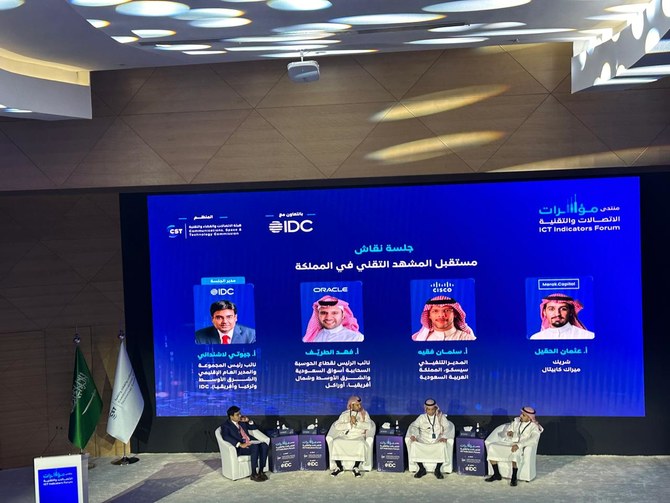
RIYADH: Saudi Arabia is the fastest-growing information technology market in the Middle East, Turkey, and the African region, with double-digit growth in technology spending, according to analysts.
Jyoti Lalchandani, regional managing director of research firm IDC, said wider information and communication technology market spending is expected to reach $37.5 billion by the end of 2024.
The comments were made during the ICT Indicators Forum, which was hosted by the Ministry of Communication and Information Technology alongside the Communications, Space, and Technology Commission in Riyadh on April 24.
It was further noted that spending in this area across the Saudi government sector would exceed $752 million by the end of 2024 as innovative technologies become foundational to building an “experience economy.”
“AI, big data analytics, IoT, and cybersecurity spending is poised for tremendous growth and will account for almost one-third of overall IT spending in Saudi Arabia in 2024. Spending on AI in Saudi Arabia will surpass $720 million in 2024, reaching $1.9 billion by 2027 at a CAGR (compound annual growth rate) of 40 percent—half of that will be on interpretative AI,” Lalchandani said.
“We have seen Saudi Arabia emerge as a hub for the cloud,” he added, with spending on public cloud forecasted to surpass $2.4 billion in 2024 and reach $4.7 billion by 2027.
Software-as-a-Service will account for more than 50 percent of the 2024 spending.
IDP further highlighted that spending on cybersecurity alone will surpass the $1 billion mark in 2024 and reach $1.6 billion in 2027.
“I do remember a few years ago, the cybersecurity market was estimated at about $500 million. Today, we’re talking about literally double that. We’re talking about $1 billion in the cybersecurity industry, and to hear it be called the fastest growing market in the region is really a testament to our beloved nation,” Salman Faqeeh, CEO of Cisco Saudi Arabia, said while speaking on a panel during the forum.
GCC oil companies can maintain solid credit metrics in net-zero journey: S&P Global

RIYADH: National oil companies in Gulf Cooperation Council countries could absorb the additional investments needed to transition toward net-zero while maintaining robust credit metrics, said S&P Global.
In its latest report, the credit rating agency noted that NOCs in the GCC face similar energy transition risks as their global counterparts, but their strong financial positions will help mitigate these impacts.
Rawan Oueidat, credit analyst at S&P Global Ratings, said: “We expect that GCC NOCs will have sufficient financial buffers and competitive advantages to absorb the incremental investments that are necessary to catch up with global peers and that they can preserve their credit ratios over the next five years.”
He added: “GCC NOCs’ average low-carbon investments would have to total $15 billion-$25 billion annually at least until 2026 to keep up with those of global listed peers. Even after factoring in these investments, the overall effect on NOCs’ debt to EBITDA (earnings before interest, taxes, depreciation, and amortization) would be below 2.0x on average.”
According to the report, these firms can fund most of their net zero projects without having to revert to external financing sources.
S&P Global added that both banks and capital markets will play a role in funding the regional countries’ energy transition.
“Given the size of the GCC banking systems and their capitalization, we expect they will have the capacity to cater for the funding needs of the NOCs’ low-carbon investments over the next few years if necessary,” stated the agency.
It added: “However, we observe that NOCs, which are generally among the largest and internally-focused corporates in the GCC countries, are typically financed outside the local banking systems.”
The report highlighted that while firms in the region benefit from strong balance sheets, they will need to carefully consider investment requirements in relation to dividend distributions.
It further noted that the majority of NOCs in the GCC have already established net-zero targets, with Saudi Aramco aiming to achieve this by 2050 and Abu Dhabi National Oil Co. targeting a goal by 2045.
S&P Global further noted that environmental, social, and governance disclosures among oil firms in the region have increased, particularly in disclosing scope 2 emissions, but still lag behind their global counterparts.
However, the report highlighted that most NOCs in the GCC have not yet disclosed scope 3 emissions.
Scope 2 refers to emissions released into the atmosphere from the use of purchased energy.
On the other hand, scope 3 encompasses indirect emissions in a company’s value chain, and it is generally considered complex and challenging to report.
GCC logistics sector set to expand as Saudi Cabinet approves regional transport law

RIYADH: The logistics sector across the Gulf Cooperation Council region is set to prosper following the Saudi Cabinet’s approval of a land transport law within the region.
Chaired by King Salman, a ministerial session was held in Jeddah, during which the Cabinet reached consensus on several key proposals. Among these was the endorsement of the unified law.
The system is crafted to enhance the organizational environment, simplify procedures, and foster unity. Moreover, it aims to boost road safety, elevate service quality, protect investments, and stimulate growth in the logistics sector throughout the GCC region.
Global airline body calls for release of $720 million in held revenues by Pakistan, Bangladesh
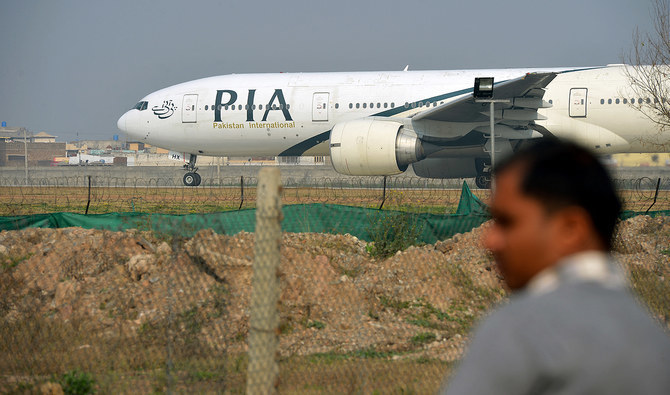
- IATA asks Pakistan in a statement to simplify the ‘onerous’ repatriation process causing ‘unnecessary delays’
- The international organization says airlines are unable to repatriate $399 million from the Pakistani market alone
KARACHI: The International Air Transport Association (IATA) on Wednesday asked Pakistan and Bangladesh to release airline revenues amounting to $720 million, saying the two countries were holding it in contravention of international agreements.
IATA, an international organization representing the global airline industry, asked Pakistan to simplify the “onerous” repatriation process involving audit and tax exemption certificates in a statement, pointing out such procedures caused “unnecessary delays.”
Bangladesh, it said, had a more standardized system, though aviation needed to be a higher central bank priority to facilitate access to foreign exchange.
“The situation has become severe with airlines unable to repatriate over $720 million ($399 million in Pakistan and $323 million in Bangladesh) of revenues earned in these markets,” the statement informed.
IATA’s regional vice president for Asia-Pacific Philip Goh emphasized that the timely repatriation of revenues to different countries was critical for payment of dollar denominated expenses such as lease agreements, spare parts, overflight fees and fuel.
“Delaying repatriation contravenes international obligations written into bilateral agreements and increases exchange rate risks for airlines,” he said. “Pakistan and Bangladesh must release the more than $720 million that they are blocking with immediate effect so that airlines can continue to efficiently provide the air connectivity on which both these economies rely.”
Goh maintained that his organization recognized the two governments were facing difficult challenges, making it necessary for them to determine how to utilize foreign currencies strategically.
“Airlines operate on razor-thin margins,” he continued. “They need to prioritize the markets they serve based on the confidence they have in being able to pay their expenses with revenues that are remitted in a timely and efficient fashion.”
He pointed out reduced air connectivity limited the potential for economic growth, foreign investment and exports, adding such large sums of money involved in the Pakistani and Bangladeshi markets necessitated urgent solutions.
Saudi Arabia to develop 320k new hotel rooms by 2030: Knight Frank

RIYADH: Saudi Arabia is gearing up to expand its hospitality sector by developing 320,000 new hotel rooms by 2030, according to an analysis by global property giant Knight Frank.
The consultancy’s study disclosed that as much as 67 percent of the planned hotel room supply in the Kingdom would fall in the “upscale” or “luxury” categories, referring to 4-star and 5-star accommodations, respectively.
This move aims to cater to the projected surge in tourism, with 150 million domestic and international tourists expected by 2030.
“With a target of welcoming 150 million visitors by 2030—a 50 percent increase from its previous goal—the government is actively exploring various strategies to attract to international travelers,” Partner and Head of Hospitality at Tourism and Leisure Advisory in Middle East and Africa Turab Saleem said.
Saleem noted that this includes the development of cultural and entertainment offerings nationwide, which complement existing attractions like the Jeddah F1 Grand Prix and numerous entertainment seasons.
“Noteworthy additions include theme parks such as Boulevard World in Riyadh, alongside the licensing of 24 additional theme parks by the Saudi General Entertainment Authority over the past year,” he added.


